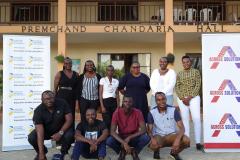Research Projects -On Going-SGRE
Title: What is Hateful in ‘Hate speech’? A Linguistic Analysis of ‘Hate Speech’ and the Impact of Public Response on the Strive for National Cohesion in Kenya.
Researchers: Sarah Ambiyo & Angelina Kioko Ph.D
This study sought to identify the linguistic features that characterise discourses identified as ‘hate speech’ in Kenya, describe the perceptions of and response to ‘hate speech’ by the Kenyan public, and evaluate the impact of these perceptions and response by Kenyan public on the national fight against ‘hate speech’. The research made use of video clips of hate speech as the major source of data for the linguistics analysis part of the study; to determine public perception and response to hate speech, and impact of this to the national cohesion initiatives, the researchers used a combination of questionnaires, interviews and focus group discussions. The linguistic analysis was mainly based on Speech Acts Theory.
Title: Factors Influencing the Quality of Postgraduate Research at the United States International University-Africa, Kenya
Researchers: Josephine Arasa Ph.D & Munyae Mulinge Ph.D
Buoyed by the important role that research plays in economic growth and development and, consequently, in the attainment of Sustainable Development Goals (SDG) the study focuses on the factors that influence the incubation (training) of researchers at the postgraduate level at the United States International University-Africa (USIU-A), Kenya. The study seeks to document the existing postgraduate research training policies and practices, appraise the level of awareness of existing policies and practices among faculty and learners and identify the mechanisms that USIU-Africa has put in place to enforce and monitor adherence to policies and practices
Title: Evaluation of financial adequacy & sustainability of free maternity policy in Kenya: A case study of Kenyatta National Hopital (KNH)
Principal Investigator: Bernard Omboi Ph.D
Since the roll out of the free maternity policy by the Kenya Government, there has been an outcry from health facilities on inadequacy and delayed re-imbursement of the fund, some institutions threatening to abolish the system altogether. The study sought to analyse the financial adequacy and sustainability of the programme with the aim of advising on the adequate figure using KNH as a case study being the largest referral health facility in East and Central Africa.
Title: Isolation and Screening of Potential Bioplastics Producing Halophiles from Kenyan Soda Lakes (Lake Magadi and Bogoria)
Principal Investigator: Betty Mbatia Ph.D
Use of synthetic plastics derived from petroleum is associated with many challenges such as dwindling oil reserves and pollution due to non-biodegradability. In an effort to minimize the amount of plastic wastes in landfills, there is increased interest in recycling and re-using plastic materials. There has also been a great interest to shift to more sustainable source of plastics. Biologically-synthesized plastics, Polyhydroxyalkanoates (PHAs), have received considerable interests due to their similar physical properties to synthetic plastics. The overall objective of the study is to screen for novel PHAs producing microorganisms from Lakes Magadi and Bogoria that can grow on cheap substrate and under minimal sterile condition. Specifically, the study seeks to perform morphological, physiological and molecular characterization of the PHA producing micro-organisms, screen and characterizes the produced PHAs and determine the optimum conditions (pH, temp and salt concentration) for PHAs production in selected strains.
Title: Chronic exposure to Catha edulis F (miraa aka Khat) extract on testicular functions, Connexin43 and gap junctional intercellular communication
Principal Investigator: Caroline Kahiri Ph.D
25% of couples are infertile, which could be due to female, male, or both male and female factors. In 10-15% of these cases, the cause of infertility cannot be explained. Mutated or defective gap junction proteins, connexins compromise fertility in mice, rats and humans, which could account for some of the unknown causes of infertility. This study seeks to clarify the effect of miraa on spermatogenesis, and provide a possible mechanism by which miraa affects reproduction in males. This will give an insight on its medicinal effects and treatment options in individuals affected by chronic exposure to the substance.
Title: Evaluation of the internship program by students, faculty and administrators at the United States International University-Africa.
Researchers: Josephine Arasa Ph.D & Elsie Newa
Academic internships have been a part of the landscape of higher education with many undergraduate and graduate programs having at least an internship. The purpose of this research will be to evaluate the internship program at the United States international university-Africa by students’ faculty and administrators so as to determine the extent to which the learning outcomes of the program are being realised.
Title: Technological innovation and method for monitoring a vehicle and influencing driver behavior to reduce speed related traffic road accidents
Principal Investigator: Jimmy Macharia Ph.D
This study aims to obtain the stake holders input and involvement in the final design of the driver/motor vehicle GPS tracking and speed monitoring device, implement the infrastructure required to host and run the system, Obtain users/ stake holders actual feedback from the test phase, and Investigate the critical success factors in the adoption of the invention by stakeholders.
Title: Genetic and molecular characterisation of loci in the human malaria parasite Plasmodium falciparum that determine differential rates of parasite multiplication in vitro and in vivo.
Principal Investigator: Jonathan Mwangi Ph.D
Plasmodium falciparum is the parasite responsible for the deaths of over 1 million malaria sufferes a year. In order to better understand this parasite and to develop new ways to tackle it, it is important to understand the mechanisms underlying its virulence and infectivity, as well as its fundamental biology. As higher parasitaemia correlates to disease severity in humans, we want to understand the parasitic factors contributing to increased parasitaemia and to establish the genes involved. One factor which is thought to contribute to parasitaemia is the time it takes for the parasite to undergo the asexual multiplication in red blood cells- erythrocytic cycle time. Another key factor of parasitaemia is the number of merozoites produced by mature schizonts on completion of the asexual phase. This study seeks to validate the candidate genes (mapped using QTL) associated with these traits in parasites isolated from patients by using malaria patients’ samples from the Wellcome Trust/Kenya Medical Research Institute in Kilifi.
Title: Development and validation of a technology mediated knowledge management framework for local governments in developing economies: A case of Kenya
Principal Investigator: Joshua Rumo Ph.D
While several studies have indicated the critical role played by economies’ ability to exploit knowledge as an economic resource, very few studies can be traced to understanding the local governments’ practices in exploring knowledge. Developing economies like Kenya require to adopt bespoke solutions to overcome its challenges. Such solutions take into consideration and accommodates the uniqueness of the country. Using sequential exploratory design, the study seeks to understand the knowledge management practices within the County Governments in Kenya and propose a technology mediated framework that can be employed to enhance the knowledge management practices within the county governments.
Title: The Effectiveness of legal sanctions in dealing with drinking drivers in Nairobi County, Nairobi-Kenya
Principal Investigator: Simeon Sungi Ph.D
The study investigates the effectiveness drinking of legal sanctions as it relates to drinking and driving in Nairobi County in Kenya. Since the introduction of the Breathalyzer to enforce the provisions of the Traffic Act (Cap.43) of the Laws of Kenya there has not been any empirical study that has evaluated the effectiveness of the sanctions under the law. This research is grounded under deterrence theory that assumes that for punishment to be effective in modifying behavior it must be certain, swift and severe. Section 44(1) of Cap 43 states that “any person who, when driving or attempting to drive, or when in charge of a motor vehicle on a road or other public place, is under the influence of drink or drug to such an extent as to be incapable of having proper control of the vehicle, shall be guilty of an offense and liable to a fine not exceeding one hundred thousand shillings or to imprisonment for a term not exceeding two years or both. The problem statement, thus investigates whether there is evidence that suggests that the criminal punishment under the Cap 43 is effective in deterring drinking drivers in Nairobi County in Kenya.
Title: Fabrication of Nanostructured Polyamic Acid filters for water purification to help control waterborne diseases in Kenya
Principal Investigator: Naumih Noah Ph.D
Co-Investigators: Betty Mbatia, Apollo Maima, Kevin Odhiambo & Eugene Etoo
Globally, WHO reports that 1 in 8 persons lack access to safe drinking water and estimates that 3.5 million people, of which 84% are children and 98% occur in the developing countries, die every year from water borne diseases such as NTDs, emanating from drinking unsafe water. Nanotechnology has the potential to deliver affordable and effective solutions for water sanitation/purification, providing access to safe drinking water to millions of people and therefore contributing to poverty alleviation and achievement of the Sustainable Development Goals (SDGs). This study seeks to; synthesize and characterize Nanostructured PAA membranes, optimize the performance characteristics of the Nanostructured PAA membranes, apply the Nanostructured PAA membranes in the removal of heavy metals and microbes in water, design characterize and validate low cost Nanostructured PAA membrane nano-filters in removal of heavy metal pollutants and microbes such as Escherichia coli in water collected from different parts of Kenya and to train and involve stakeholders on the use of the low cost Nanostructured PAA membrane nano-filters as a method of controlling water pollution.
Title: Development of a citizen observatory early warning system for disease outbreak
Principal Investigator: Silvester Namuye Ph.D
Co-Investigators: Leah Mutanu & Daltron Ndirangu
The provision of information on emerging dangerous circumstances in order to reduce the risks before they occur has triggered a lot of research interest in the recent past. The first phase of this research called for identifying of pilot areas to conduct the research, conducting a feasibility study on common infectious diseases in the pilot area, Developing a framework for an early warning system, and finally designing and developing a prototype to be used test the framework.
Title: Road Safety Enhancement in Kenya Using GSM/GPS Location Based Technologies
Principal Investigator: Gerald Chege Ph.D
Co-Investigators: Leah Mutanu & Phillip Machoka
According to the National Transport and Safety Authority (NTSA) the total number of accidents in Kenya in 2016 was 11,713 out of which 2,575 died (NTSA, 2016) and according to World Health Organization the estimated fatalities could be as high as 12,891 (WHO, 2015). The purpose of this study is to geo-tag the various speed zones on Kenyan roads, capture them into a cloud server, and generate various speed alerts to drivers using a mobile phone while driving. According to the Communication Authority of Kenya there were 39.7 million mobile subscribers in Kenya as at June 2016 (CAK, 2016). The proposed solution plans to take advantage the cellular technologies and of this mobile reach.
Partners:
USAID, RBA, IRA, AMREF,




